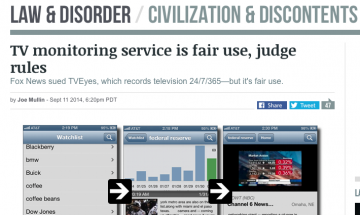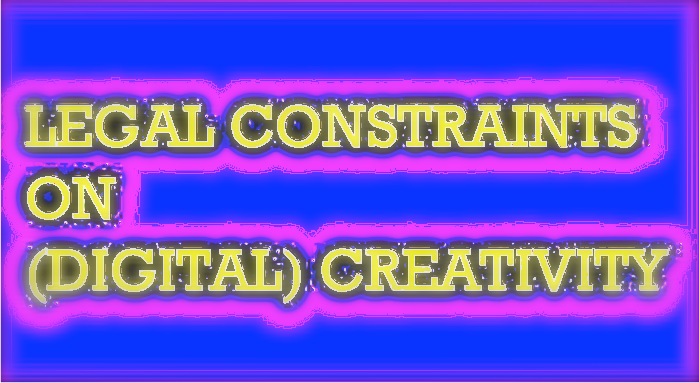TV monitoring service is fair use, judge rules | Ars Technica.
This is a very important story to note for when we talk about copyright two classes from now. How do you feel about this? Should news monitoring services be able to make money from new organizations materials? What are the implications for newsrooms using each others materials?
jon


 Legal Constraints on (Digital) Creativity
Legal Constraints on (Digital) Creativity
This is a really neat article and a thought provoking piece. I am of the opinion that news snippets are similar to abstracts of scholarly articles or chapter 1 previews on google books and thus I do believe the ruling which designated news snippets as innovative fair use was correct.
As aspiring journalists we all want credit for our work and that is a perfectly legitimate response. However, with the propagation of digital sharing technologies we all need to recognize that our work will sometimes be used in a way we may not like. As tveyes has shown, using small summaries that are non-sequential and collecting them in a database is in the eyes of the law perfectly legal.
There is a fine line though and as the article mentions, this line is that of taking material word for word and posting the whole thing. As long as it related to excerpts for fair use I see no problem.
The one problem is that this may create precedent and expand to an unreasonable level. I am of the opinion however that once I publish something that is relevant to the public discourse it has an inherent right to be used by the public to inform themselves, regardless of where it originated from.
Hope that makes sense.
-K
Your analysis is right on in my view Konstantine. What seems compelling to me is that no one would use the monitoring service instead of TV. Totally different market. Where is the harm? Not sure I can see it.
jon
Fascinating article – definitely one that encourages critical thought and discussion. I don’t see any problem with TVEyes’ work and I agree with Hallerstein’s ruling that the keyword search function is fair use. I am interested in finding out more about TVEyes’ subscribers, as the article mentions a lot of organizations and government bodies that are subscribers, but how many individuals subscribe and how many for non-work purposes? At $500/month for a subscription, I can’t imagine it would reach the average person for professional or non-professional use. I think it could be a useful resource for any independent writer, critic, journalist, or simply engaged citizen, and in the current age of “citizen journalism” and global sharing of information, why not make it more available – affordable – to them? What do you think, Jon? Would that change in business model be wise, or even necessary? To my fellow classmates, would you use TVEyes for personal and/or professional use, if money was no object or it became affordable?
The conundrum that copyright law sets up is profound. The more popular TVEyes becomes the less likely it is to be considered a fair use. One of the core points that saved it in the courts was that its “market” was not the same as the mass audience that the news organizations who generated the basic content were going after. So it is a continuum, and the legal question becomes entangled with the question of “how popular is it?” Made even more complicated by the “who is a journalist?” question. If everyone is, then the notion that a media monitoring is directed towards “journalists” starts to look less than logical.
jon